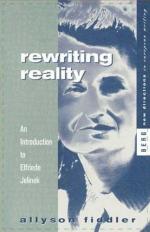|
This section contains 5,565 words (approx. 19 pages at 300 words per page) |

|
SOURCE: Jelinek, Elfriede, and Gitta Honegger. “The German Language: An Interview with Elfriede Jelinek.” Theater 25, no. 1 (spring-summer 1994): 14-22.
In the following interview, Jelinek discusses the influence of philosopher Martin Heidegger on her work, her role as an artist, and writing within the Austrian literary tradition.
On a home movie screen a middle-aged woman carrying a suitcase wanders along a mountain path. Hannah Arendt is returning, after the war, to visit Heidegger in Todtnauberg, his beloved Black Forest country retreat. For her play's title, Austrian writer Elfriede Jelinek extracts the root words hidden in the village's name. It only takes a slight adjustment to create Totenauberg, Mountain/Meadow of the Dead, to highlight what's in a (compound) name, and set up the ironic context for its most famous inhabitant and the central tenets of his philosophy. In that philosophy, Nature/home/habitation function like Duchampian “hinges” in a construct...
|
This section contains 5,565 words (approx. 19 pages at 300 words per page) |

|


